
By RAMOLA TALWAR BADAM, Associated Press Writer
BOMBAY, India - Seven bombs hit Bombay's commuter rail network during rush hour Tuesday evening, killing at least 200 people and wounding more than 700 in what authorities called a well-coordinated terrorist attack. There was no immediate claim of responsibility in the bombings, which came in quick succession — a common tactic employed by Kashmiri militants. The blasts came hours after a series of grenade attacks by Islamic extremists killed eight people in the main city of India's part of Kashmir.
India's major cities were put on high alert. Indian Prime Minister Manmohan Singh called an emergency Cabinet meeting and said that "terrorists" were behind the attacks.
Pakistan, India's rival over the disputed territory of Kashmir, quicky condemned the bombings.
Chaos engulfed the crowded rail network in India's financial capital following the blasts that ripped apart densely packed train compartments. Doors and windows were blown off the train cars, and witnesses said body parts were strewn near stations.
Authorities struggled to treat survivors and recover the dead in the wreckage amid heavy monsoon downpours. Survivors clutched bandages to their heads and faces, and some frantically dialed their cell phones. Luggage and debris were spattered with blood.
The chief secretary of Maharashtra state, D.K. Shankaran, said at least 105 people had been killed. Bombay Police Chief A.N. Roy estimated on Indian television that more than 300 were wounded.
Press Trust of India news agency, citing a senior official, said at least 147 people had been killed and 439 injured.
"We are busy in the rescue operation. Our first priority is to rescue the injured people," Roy said.
In Washington, the State Department said it had no information about whether there were any American casualties.
Commuter transit systems have been tempting targets for terrorists in recent years, with bombers killing 191 in Madrid, Spain, in 2004, and 52 in London last year.
A senior Bombay police official, P.S. Pasricha, said the explosions were part of a well-coordinated attack. Vilasrao Deshmukh, the chief minister of Maharashtra state, where Bombay is located, said bombs had caused all seven blasts.
It was not immediately clear if suicide bombers were involved or if the explosives were triggered by remote control or timing devices.
Police reportedly carried out raids across the country following the Bombay blasts. One TV station said a suspect was in custody.
Indian Home Minister Shivraj Patil told reporters that authorities had had some information that an attack was coming, "but place and time was not known."
The bombings occurred after the stock markets ended. The commercial capital suffered similar serial blasts in 1993 that included the Bombay Stock Exchange, killing more than 250 people.
Tuesday evening's first explosion hit a train at a railway station in the northwestern suburb of Khar, said a police officer who spoke on the condition of anonymity because he was not authorized to talk to the media.
India's CNN-IBN television news, which had a reporter aboard one train, said a blast struck a first-class compartment as the train was moving, ripping through the compartment and killing more than a dozen people.
Roy said other blasts targeted trains, railway tracks and platforms. One explosion occurred near an underground subway station.
The Press Trust of India, citing railway officials, said all the blasts had hit first-class cars.
Pranay Prabhakar, the spokesman for the Western Railway, said all train service had been suspended and appealed to the public to stay away from stations in the city of 16 million people — India's principal port on the Arabian Sea.
India and Pakistan have fought three wars since the subcontinent was partitioned upon independence from Britain in 1947, two over Kashmir.
Dozens of militant groups have been fighting Indian rule in Kashmir, demanding the mostly Muslim region's independence, or its merger with Pakistan.
The Pakistani Foreign Ministry late Tuesday strongly condemned the Bombay attacks.
Pakistani President Gen. Pervez Musharraf offered condolences over the loss of life, the Foreign Ministry said, adding: "Terrorism is a bane of our times and it must be condemned, rejected and countered effectively and comprehensively."
New Delhi has accused Pakistan of training, arming and funding the militants. Islamabad insists it only offers the rebels diplomatic and moral support.
Accusations of Pakistani involvement in a 2001 attack on India's parliament put the nuclear-armed rivals on the brink of a fourth war. But since then, Pakistan and India embarked on a peace process aimed at resolving their differences, including their conflicting claims to all of Jammu-Kashmir.
In Washington, two U.S. officials who spoke on condition of anonymity because the events were still unfolding said it was too early to know for certain what group was behind the attacks. But both officials said they were likely part of the sectarian violence over Kashmir.
One of the officials said the attacks' coordinated nature and their targeting of trains at peak travel times match the modus operandi of two Islamic extremist groups that have been active in India during the last several years: Lashkar-e-Tayyaba, or Army of the Righteous, and Jaish-e-Mohammad, or Army of Mohammed.
The U.S. government has designated both groups as terrorist organizations and considers them affiliates of al-Qaida.







No comments:
Post a Comment